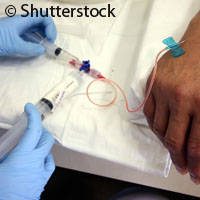Latest research shows how cancer cells react to chemotherapy
EU-funded researchers have made good progress in understanding how cancer cells can sometimes resist the effects of chemotherapy. This new knowledge will move forward the development of increasingly effective cancer treatments and could go some way to reducing relapse, good news for cancer patients and scientists alike. As part of the APO-SYS ('Apoptosis systems biology applied to cancer and AIDS') project, which received a funding boost of EUR 11 million under the 'Health' Theme of the Seventh Framework Programme (FP7), the team of researchers from the Dublin-based Royal College of Surgeons in Ireland (RCSI) carried out a comprehensive study of cancer cells. Writing in the journal Molecular Systems Biology, the team explain how their findings show that chemotherapy resistance occurs due to metabolism differences between cancer cells and normal human cells. In chemotherapy, anti-cancer drugs are used to kill cancer cells. They do this by stimulating a process of programmed cell death called apoptosis, as well as hindering the function of the mitochondria. The mitochondria is responsible for regulating cell energy production and maintaining a balance of water and ions; therefore, if the mitochondria is paralysed, the whole cell cannot function. However, in addition to producing energy in the mitochondria, cancer cells can also produce energy by using glucose in a process known as glycolysis. Although previous studies have shown that the process of glycolysis can effectively bring cancer cells being targeted by chemotherapy 'back to life', the Irish team has now found that glycolysis also helps to restore mitochondrial function, meaning that cancer cells may continue to function following the treatment. This study, which was based on computational modelling and live cell microscopy, brings scientists closer to understanding why and how some cancer cells survive both apoptosis and mitochondria impairment. Dr Heinrich Huber, lead researcher on the study from the RCSI, says: 'Our findings show that when cancer cells are exposed to elevated glucose levels, mitochondrial function can be restored and osmotic homeostasis can be maintained, which contributes to resistance to chemotherapy. Therefore, we have found that in order for cancer treatments to be effective, they must target the cancer cell's ability to produce energy by using glucose within its fluids as well as destroying the mitochondria. It is also important that glucose levels in patients are monitored because this can be a factor in resistance to treatment.' According to figures from the World Health Organization (WHO), cancer is one of the main causes of death worldwide and was responsible for 7.6 million deaths (approximately 13 % of all deaths) in 2008. The WHO also estimates that this figure will rise to over 11 million by 2030. As understanding the mechanistic details of how cancer cells are able to resist chemotherapy can provide strategies to increase treatment efficiency and reduce clinical relapse, the team hope their research will lead to further discoveries in cancer treatment and go some way towards reducing the worldwide impact of this killer condition. The APO-SYS project, which runs until 2012, brings together a pan-European consortium of experimental biologists, biomathematicians, biostatisticians, computer scientists and clinical scientists, all working on cell death pathways in health and disease, with a particular focus on cancer and AIDS.For more information, please visit:Royal College of Surgeons in Ireland:http://www.rcsi.ie/
Countries
Ireland



